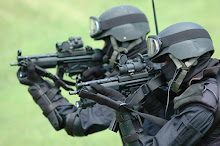





It has often been said by weapons experts that there are very few new developments on the small arms horizon that are truly revolutionary; that we have reached a plateau. Though the G11 project is dead, and was certainly a harbinger of what is possible over the horizon, the G36 is a combination of old and new, tried and true that when combined makes for the further refinement of the small arms maker's art. Instead of starting from scratch with totally new design, the engineers at HK, led by the young and rising star Ernst Mauch, through the early years of the 1990s made what was internally called the HK50. It now carries the Bundeswehr designation G36.
A first departure from the signature HK operating system, roller delayed blowback, the G36 is gas operated.
They borrowed from other tried and proven designs. There is the short gas system reminiscent of the Kalashnikov and FAL designs. The rotating bolt of the M16 series. The bolt carrier of the AR18. The folding stock of the FAL and SIG 550 series. But in the newest refinement of the gunmaker's art with respect to military rifles, the extensive use of polymer throughout the rifle makes it lighter and more corrosion resistant; two qualities essential to the soldier.
The G36 is a reliable rifle, much more so than the M16 series. Though hard core M16 and AR-15 aficionados will have a difficult time accepting what they might describe derisively as 'Euro-Trash,' there is no denying the fact that the G36 rarely, if ever, jams. The most desirable departure from the M16 design is the fact that the gas used to operate the action is vented in the forearm, and not blown back into the action like the 'exhaust pipe' of the M16 gas tube. The G36 jams so rarely that HK has said that they have a G36K that has been fired more than 25,000 rounds without cleaning and no failures. I defy an M16 to duplicate that.
Though it would be doubtful that the G36 would ever replace the M16 for the U.S. military, it is taking off in the U.S. law enforcement community. Why not? Quality is in high demand.

No comments:
Post a Comment